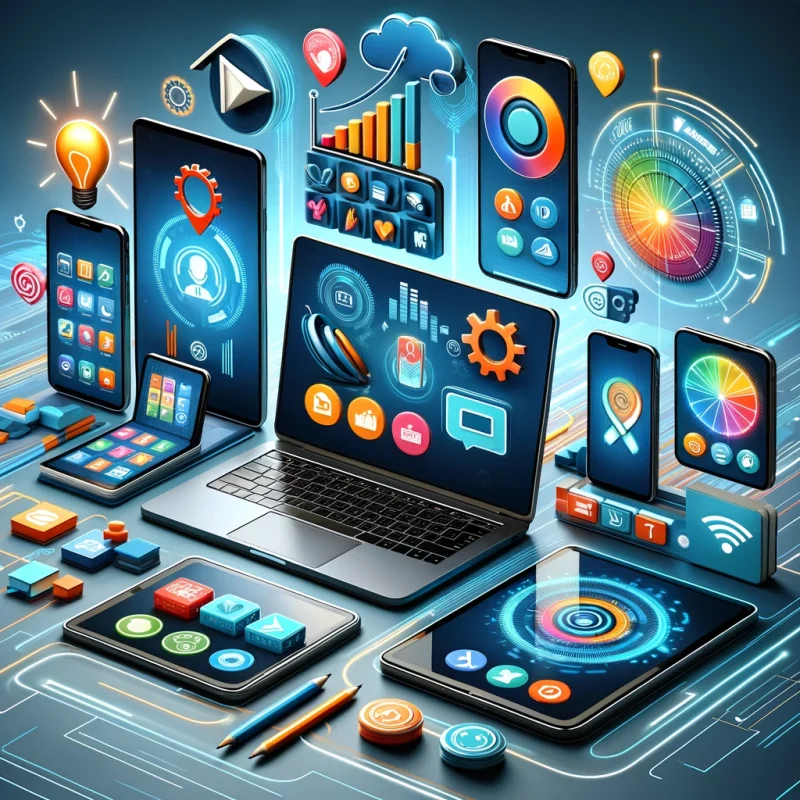Master Your Skills: The Best Learning Tools You Need Today

Introduction
In an era where knowledge evolves at breakneck speed, mastering new skills is no longer a luxury but a necessity.
Whether you are enhancing your professional expertise or expanding your personal horizons, the ability to learn efficiently is critical. But with a dizzying array of tools at our disposal, finding the ones that truly complement your learning journey is paramount.
This guide explores the best resources to help you maximise your potential in today’s fast-paced world.
Why Developing Your Skills Is Crucial in Today’s World
In today’s hyper-competitive global landscape, standing still is akin to falling behind. Employers and industries demand adaptability and innovation, and individuals who consistently refine their skillsets stay ahead of the curve.
Developing new skills not only enhances career opportunities but also boosts personal confidence, allowing individuals to navigate challenges with resilience and creativity.
How the Right Tools Can Make All the Difference
Having the right tools is akin to having a map of uncharted territory. While motivation and discipline are essential, the efficiency of your learning process can be exponentially enhanced with tools designed to cater to different learning styles.
The right platforms and resources streamline learning, making the process less daunting and more engaging.
Understanding Your Learning Style
Everyone absorbs information differently. Some thrive in visual environments, while others prefer auditory or kinesthetic experiences.
Understanding your unique learning style is the first step toward mastering any new skill. Do you learn best by doing, listening, or seeing? Knowing this will shape your approach to acquiring knowledge.
Identifying Your Personal Learning Preferences
Your learning preferences extend beyond just how you absorb information. Factors such as time of day, attention span, and even environment play critical roles. Do you focus better on short bursts or long, uninterrupted sessions?
By identifying these preferences, you can tailor your tools and methods to fit your natural tendencies, thereby optimising the learning process.
Choosing Tools That Complement Your Learning Style
Choosing tools that align with your learning style is pivotal. For visual learners, platforms rich in videos and infographics work wonders.
Auditory learners might prefer podcasts or courses with audio-based instruction. Kinesthetics learners benefit from interactive platforms that involve hands-on practice.
Select tools that resonate with your cognitive strengths for maximum retention and understanding.
Top Digital Learning Platforms for Every Learner
Coursera, edX, and Udemy: Diverse Learning Opportunities
Coursera, edX, and Udemy are the cornerstones of online education, offering a vast array of courses across disciplines.
Whether you want to delve into computer science or explore the intricacies of art history, these platforms provide structured courses with flexibility for learners of all levels.
Khan Academy: Free and Comprehensive Education for All Ages
Khan Academy offers free, high-quality education for learners of all ages.
From elementary mathematics to advanced economics, this platform is known for its accessible explanations and breadth of topics, making it ideal for lifelong learners on a budget.
LinkedIn Learning: Professional Development at Your Fingertips
For those seeking to boost their career, LinkedIn Learning offers courses tailored to professional development.
From leadership training to mastering Excel, this platform integrates seamlessly with your LinkedIn profile, showcasing your learning achievements to potential employers.
Best Tools for Hands-On Learning
Skillshare: Creative and Practical Skill-Building
Skillshare focuses on creative skills like design, photography, and writing.
With a hands-on approach, it encourages learners to dive into projects, making the learning process immersive and interactive.
Codecademy: Master Programming Skills with Interactive Lessons
For budding developers, Codecademy offers interactive lessons that simplify complex programming languages.
Whether you are learning Python or JavaScript, the platform allows you to practice coding in real time, reinforcing skills through hands-on experience.
Duolingo: Fun and Effective Language Learning
Learning a new language can be daunting, but Duolingo turns it into a game.
With its fun, bite-sized lessons, this platform makes language acquisition engaging and less overwhelming, whether you are a beginner or looking to polish your fluency.
Productivity and Organisation Tools to Stay on Track
Notion: All-in-One Workspace for Notes and Projects
Notion is an all-encompassing workspace, perfect for organising learning materials, creating to-do lists, and managing projects.
Its flexibility allows users to adapt it to their personal workflow, making it an essential tool for learners juggling multiple tasks.
Trello: Visual Task Management for Seamless Learning
For visual learners who enjoy task-based organisation, Trello’s board system is ideal.
It breaks down projects into manageable chunks, helping you track progress and stay motivated as you complete each stage of your learning journey.
Evernote: Capturing and Organising Ideas for Better Retention
Evernote is the ultimate note-taking tool, perfect for capturing and organising thoughts.
Its ability to sync across devices ensures that your ideas are always at your fingertips, making it easier to review and retain information.
Leveraging AI and Automation in Learning
How AI Can Personalise Your Learning Journey
Artificial intelligence is revolutionising education by tailoring learning experiences to individual needs.
Personalised recommendations, adaptive learning paths, and real-time feedback are transforming how people approach skill development.
Grammarly: Enhance Writing Skills with AI Feedback
Grammarly offers more than just grammar correction.
It provides insights into tone, clarity, and style, helping writers refine their skills with real-time AI feedback that enhances both formal and creative writing.
ChatGPT: Using Language Models to Assist Your Studies
Language models like ChatGPT can be powerful assistants in research and writing.
From summarising complex articles to brainstorming ideas, these models are a valuable resource for learners looking to expand their knowledge quickly and efficiently.
Collaborative Learning Tools for Peer Engagement
Zoom: Making Remote Learning Interactive
Zoom has become indispensable for remote learning.
Its video conferencing features allow for real-time interaction, making online classes, group projects, and peer discussions seamless and engaging.
Google Workspace: Collaborate on Learning Projects in Real-Time
Google Workspace enables teams to collaborate on projects in real time.
With tools like Docs and Slides, multiple users can work simultaneously on presentations, research papers, and assignments, fostering a truly collaborative learning environment.
Slack: Creating Learning Communities and Sharing Knowledge
Slack goes beyond workplace communication.
It is an excellent tool for creating learning communities, where peers can share knowledge, resources, and insights, keeping the learning process social and dynamic.
Mobile Apps for Learning on the Go
Blinkist: Key Takeaways from Thousands of Books in Minutes
Blinkist distils complex books into concise summaries, perfect for learners who are short on time but eager to absorb new knowledge.
It is ideal for on-the-go learning, turning downtime into valuable educational moments.
Quizlet: Study Anywhere with Customizable Flashcards
Quizlet allows learners to create customisable flashcards and practice quizzes, making studying both efficient and portable. It is especially useful for memorising facts, vocabulary, and key concepts.
Coursera Mobile: Learning Anywhere, Anytime
The Coursera mobile app brings high-quality courses directly to your phone, enabling learning from anywhere.
It offers the same flexibility as the desktop version but is designed for learners on the move.
Best Tools for Creative Skill Development
Adobe Creative Cloud: Elevate Your Design and Multimedia Skills
Adobe Creative Cloud is a suite of tools that offers unparalleled capabilities in graphic design, video editing, and web development.
It is a must-have for creative professionals looking to master industry-standard software.
Canva: Simple, Powerful Graphic Design for Everyone
For those seeking an easier entry into design, Canva provides intuitive tools for creating beautiful graphics without the complexity of traditional design software.
It is perfect for social media graphics, presentations, and more.
Procreate: Master Digital Art with Ease
Procreate is the go-to tool for digital artists.
Its seamless interface and powerful features allow creators to produce professional-grade art with the ease of using a tablet, making it a staple for illustrators and designers alike.
Tools for Critical Thinking and Problem-Solving
Wolfram Alpha: Computational Intelligence at Your Disposal
Wolfram Alpha is a computational knowledge engine that can solve complex mathematical problems, analyse data, and provide detailed answers across various domains.
It is an indispensable tool for learners who need precise and analytical solutions.
Lumosity: Train Your Brain with Fun, Engaging Exercises
Lumosity offers brain-training games designed to improve cognitive functions like memory, attention, and problem-solving.
It is a great way to enhance critical thinking through fun, and scientifically-backed exercises.
MindMeister: Visual Mind Mapping for Organizing Complex Ideas
MindMeister helps learners map out ideas visually, making complex concepts easier to organise and understand.
It is especially useful for brainstorming and structuring large projects or research topics.
Tracking Your Progress and Measuring Success
Habitica: Gamify Your Learning Journey for Motivation
Habitica turns learning and productivity into a game, allowing users to track tasks, set goals, and earn rewards for completing them.
It is a fun way to stay motivated while learning new skills.
RescueTime: Tracking Learning Habits and Boosting Efficiency
RescueTime monitors your daily habits, providing insights into how you spend your time.
By identifying distractions and unproductive patterns, you can make adjustments to maximise your learning efficiency.
Toggl: Keep Track of Learning Hours and Focus Areas
Toggl allows learners to track the time they spend on different activities, giving them a clear picture of how their learning time is distributed.
This helps ensure that you are dedicating sufficient focus to each area of study.
Exploring Free vs. Paid Learning Tools
When Free Tools Are Just as Good
Many free learning tools offer features comparable to their paid counterparts.
Whether it is Khan Academy’s free educational content or Duolingo’s language lessons, learners on a budget can still access high-quality resources without breaking the bank.
The Benefits of Premium Features in Paid Tools
While free tools are often sufficient, paid versions can offer enhanced features that elevate the learning experience.
Premium features like advanced analytics, personalised feedback, or exclusive content can make a significant difference in your learning journey.
How to Choose the Best Tools for Your Learning Goals
Aligning Tools with Your Short-Term and Long-Term Objectives
When selecting learning tools, it is essential to align them with your immediate and future goals. Are you looking to build a skill quickly, or is this a long-term investment in your career?
The right tool can bridge the gap between where you are now and where you want to be.
Customising Your Learning Experience for Maximum Growth
Customisation is key to unlocking your full potential.
Whether modifying a platform’s interface to suit your preferences or choosing courses that match your pace, personalising your learning experience ensures sustained engagement and growth.
The Future of Learning Tools: What’s Next?
VR and AR: Immersive Learning Experiences on the Horizon
Virtual reality (VR) and augmented reality (AR) are set to revolutionise learning by offering immersive, interactive experiences.
From virtual classrooms to hands-on training in a simulated environment, the possibilities are boundless.
AI and Machine Learning: Advancements That Will Revolutionise Education
AI and machine learning are continuously evolving, offering learners more personalised, efficient pathways to mastery.
As these technologies advance, the future of education will see more adaptive, customised learning journeys.
Conclusion
The journey to mastering new skills is as much about consistency and commitment as it is about having the right tools.
By carefully selecting tools that match your learning style and goals, you can create a powerful personal learning toolbox. The key is to remain persistent, explore new resources, and always strive for growth.
Wishing you all the best in your learning journey!
Frequently Asked Questions (FAQ)
E-learning tools are software applications or platforms that facilitate online education, making it easier to create, deliver, and manage learning content.
Popular e-learning tools include learning management systems (LMS), virtual classrooms, content creation tools, and collaboration platforms. Examples include Moodle, Google Classroom, and Articulate 360.
LTI is a standard that allows seamless integration of learning applications with an LMS, enabling content to be updated centrally.
LTI helps institutions centralise content, streamline updates, and enhance the user experience across multiple learning platforms.
Digital learning tools enhance flexibility, improve engagement, and offer diverse formats like videos, quizzes, and interactive modules.
Digital learning tools enhance flexibility, improve engagement, and offer diverse formats like videos, quizzes, and interactive modules.
Yes, most e-learning tools support both individual and group learning through personalised learning paths and collaborative features such as shared workspaces or group activities.
Hands-on learning tools are resources like flashcards, puzzles, and physical manipulatives used to reinforce active, experiential learning.
An LMS is a platform used to create, distribute, and manage the delivery of educational content to learners
Common challenges include technical difficulties, ensuring user engagement, and choosing the right tools to fit the needs of both educators and learners.
Yes, many e-learning platforms offer free versions with basic functionalities, while premium options provide additional features.
Affiliate Declaration:
The use of affiliate links on this website may result in earning a small commission for any purchases made, at no additional cost to you (the user). Please review our privacy and cookie policy, as well as our affiliate disclaimer.

